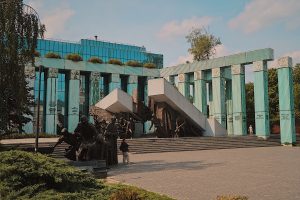
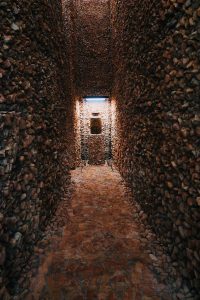
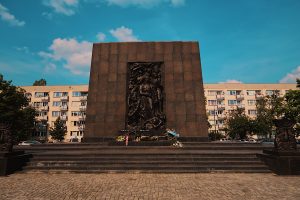
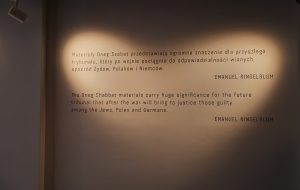
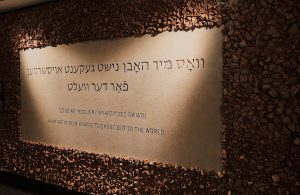
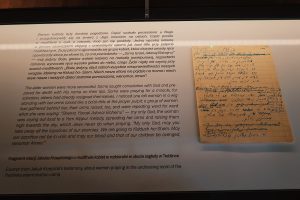
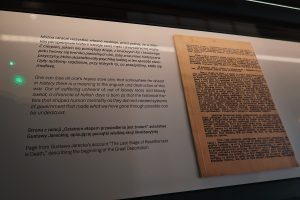
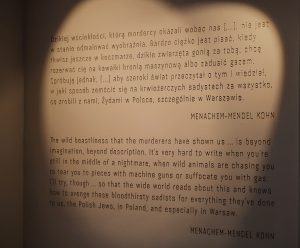
On our third day in Warsaw, I can surely say that we witnessed an abundance of physical elements of history right before our eyes. Starting the day off, we watched the movie, Who will Write our History?, by Roberta Grossman. This realistic-like reenactment of the beginning and ending of the Oneg Shabbat and Emanuel Ringelblum’s life during the WWII Warsaw Ghetto, gave us a brief introduction to what we experienced on this day. This movie was able to successfully portray how Jews were so silenced and suppressed from any form of expression whatsoever, that they had to resort to journaling and documenting in secret. Ringelblum, the initiator of this group, carefully picked out eligible candidates he knew would stay silent about the activities going on, and also produce sufficient enough material that was worth documenting. Everyday, the members of this group willingly knew that they were risking their lives and jeopardizing their safety during this time of war. Still, they readily chose to potentially help change morals of the future by recording their struggles and unjust desperations as Jews. Even until the very last minute did the remaining members of the Oleg Shabbat write down every single detail of what went on in their daily lives for as long as they were able to survive. With their intention of hiding these written documents, the members hoped that one day in the future, someone will find their testimonies and learn from the horrors of the past.
Following the screening of the movie, we were able to personally see the archives ourselves in the Jewish Historical Institute. On the behalf of everyone, I feel like this experienced rightly served as an impactful understanding of what life was really like for Jews during WWII. The fact that we were able to witness legitimate documentation and read the authentic handwriting of those victims was eye opening and evoked a certain kind of awareness and understanding. We can read or watch as much as we want about what had happened in books or movies, but seeing proof in real life radiates a completely different story.
Lastly, we went to visit two Warsaw Uprising Veterans: Dr. Lieutenant Colonel Zbigniew Galperyn and Dr. Halina Jędrzejewska. Their stories shocked us all as we sat in disbelief recognizing their bravery and eyewitness accounts they shared. They both told stories of their time during the Warsaw Uprising being medics in the hospitals and escaping to other parts of the city through sewers. They both detailed their survival stories as they were often faced personally with Nazi soldiers executing harmless people in hospitals who were being treated for injuries, or even being left on the street for days because they set an entire hospital on fire. Their stories were incredible, almost inconceivable to hear and I can only imagine what it was like for them to be put through such horrific events.
All in all, I think our day in Warsaw was a successful one. We were able to grasp a different perception and outlook to what happened in Warsaw during WWII and the Uprising, that we may have not fully attained through readings on paper or in books. The knowledge we were luckily able to receive truly changed my attitude towards the victimized civilians of Warsaw, and also the Veterans who took part in saving their own country.